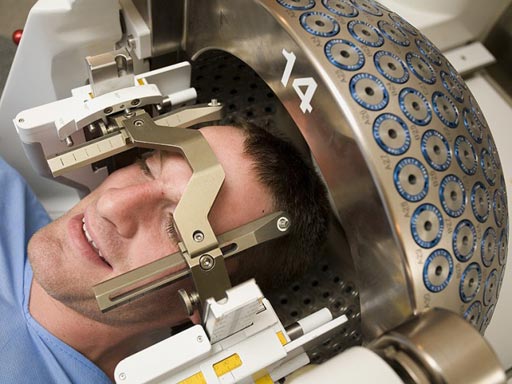Targeted Radiosurgery Superior to WBRT for Treating Brain Tumors
By MedImaging International staff writers
Posted on 03 Mar 2017
A new study suggests that stereotactic radiosurgery (SRS) provides better outcomes for patients with metastatic brain tumors than whole-brain radiation therapy (WBRT).Posted on 03 Mar 2017
Researchers at the University of Missouri conducted a retrospective study among 83 patients who received post-surgical care for the removal of a metastatic brain tumor between January 2010 and December 2014; 46 of the patients received WBRT, while 37 others underwent SRS. The study compared patient data for local control, distant brain recurrence, overall survival, and radiation therapy complications.

Image: A patient undergoing SRS following brain surgery (Photo courtesy of DioMedia).
The results showed that SRS controlled the spread of the cancerous cells as effectively as WBRT; in addition, the patients who received radiosurgery experienced less cognitive decline compared to those who received WBRT. Overall, 34% of the SRS patients experienced local recurrence, compared to 55% of WBRT patients; but the median survival rate for those patients receiving SRS was 440 days, compared to just 202 days for patients who received WBRT. The study was published on November 19, 2016, in Cureus.
“For patients with metastatic cancer of the brain, the importance of surviving for a longer period of time cannot be overstated,” said senior author Scott Litofsky, MD, chief of the division of nurological surgery at MU School of Medicine. “We now treat patients almost exclusively with radiosurgery following their surgery. Although this therapy does cost more, results often can be achieved in one to three visits, compared to 10 to 12 visits for whole-brain radiation. With these considerations, we strongly suggest physicians consider radiosurgery as an initial radiation treatment after surgery.”
Since WBRT treats the entire brain, it is thought to control tumor progression by treating identifiable metastases and otherwise unidentifiable micro-metastases. However, WBRT has become increasingly implicated with global cognitive impairment that persists after cessation of treatment, thereby expanding concerns regarding quality of life, despite reducing tumor burden. SRS delivers high-dose radiations to a discrete volume within the brain; because it spares healthy brain parenchyma, it confers a theoretically favorable alternative to WBRT, and is being increasingly utilized in the management of brain metastases.














